
Oppenheimer was the big winner at the Golden Globe Awards, taking home five awards including the top prize.
Cillian Murphy and Robert Downey Jr were both recognised for their acting performances, while Christopher Nolan won best director.
Succession scored the most wins in the TV categories following its acclaimed fourth and final season.
Meanwhile, Barbie won the first box office achievement award, after grossing $1.4bn (£1.13m) worldwide.
There were two wins each for Anatomy of a Fall, The Holdovers and Poor Things, and one for Martin Scorsese’s Killers of the Flower Moon.
The film’s star Lily Gladstone was named best drama actress, making her the first indigenous person to win the award, something she described as “historic”.
Oppenheimer star Murphy paid tribute to Nolan’s “rigour, focus and dedication” in making the film, which grossed $954m (£750m) at the box office.
In his acceptance speech. he said: “I knew the first time I walked on Christopher Nolan’s set that it was different,” he said in his acceptance speech.
“I could tell by the level of rigour, focus, dedication, and the complete lack of seating options for actors,” he joked, “that I was in the hands of a visionary director.”
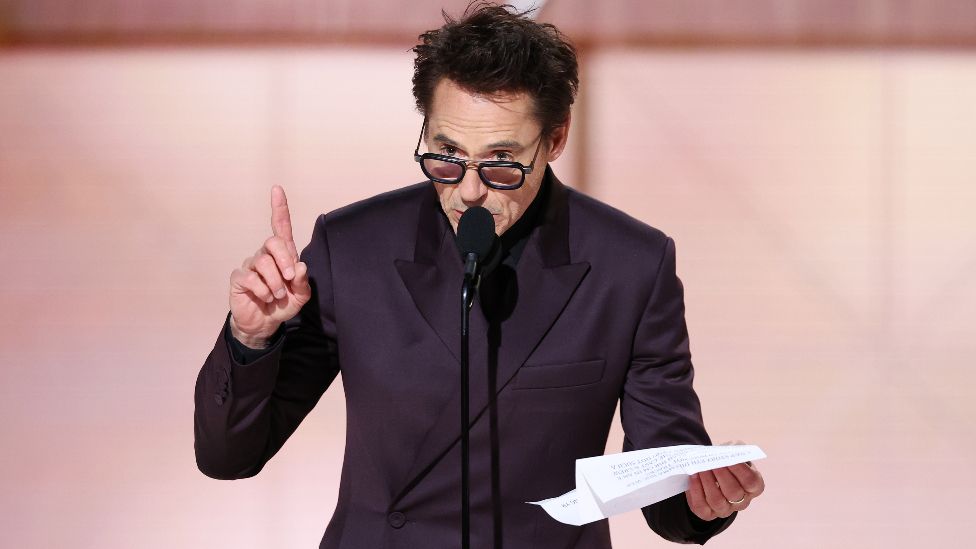

Murphy also joked about the number of Irish nominees in awards season this year – Andrew Scott and Barry Keoghan among them.
“To all my fellow nominees, whether you’re Irish or not, you’re all legends, I salute you,” he said.
The biopic also won awards for best score and best supporting actor for Downey Jr, who portrayed US government official Lewis Strauss.
Downey Jr acknowledged the film’s unlikely box office success in his acceptance speech, joking: “A sweeping story about the ethical dilemma of nuclear weapons grosses $1bn?”
The actor continued: “Dozens of folks have come up to me since the summer time saying I was unrecognisably subtle as Lewis Strauss. To my fellow nominees, let’s not pretend this is a compliment.”
He also referred to the changes made to the Golden Globes membership following a scandal over corruption and a lack of diversity. “Thanks for changing your game,” he said.
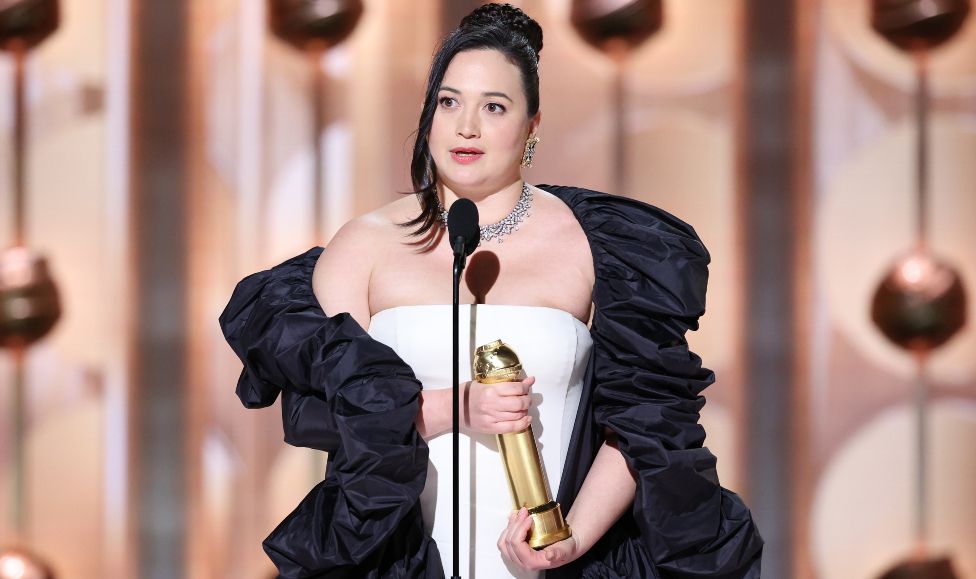

Killers of the Flower Moon star Lily Gladstone began her acceptance speech by speaking Algonquian language Blackfoot. She comes from a Blackfeet Indian Reservation in northern Montana.
“I just spoke a bit of Blackfeet language, the beautiful community nation that raised me, encouraged me to keep doing this,” she told the audience.
“I’m here with my mum, who, even though she’s not Blackfeet, worked tirelessly to get Blackfeet into our classroom.
“This award is a historic one. I’m so grateful I can speak even a little bit of my language, because in this business, Native actors used to speak their lines in English, and then their sound mixers would run them backwards to accomplish Native languages on camera.”
In Killers of the Flower Moon, Gladstone plays Mollie Burkhart, an Osage woman whose family members are brutally murdered as part of a plot by white settlers to move in on their land and take their fortune, fuelled by greed over oil.
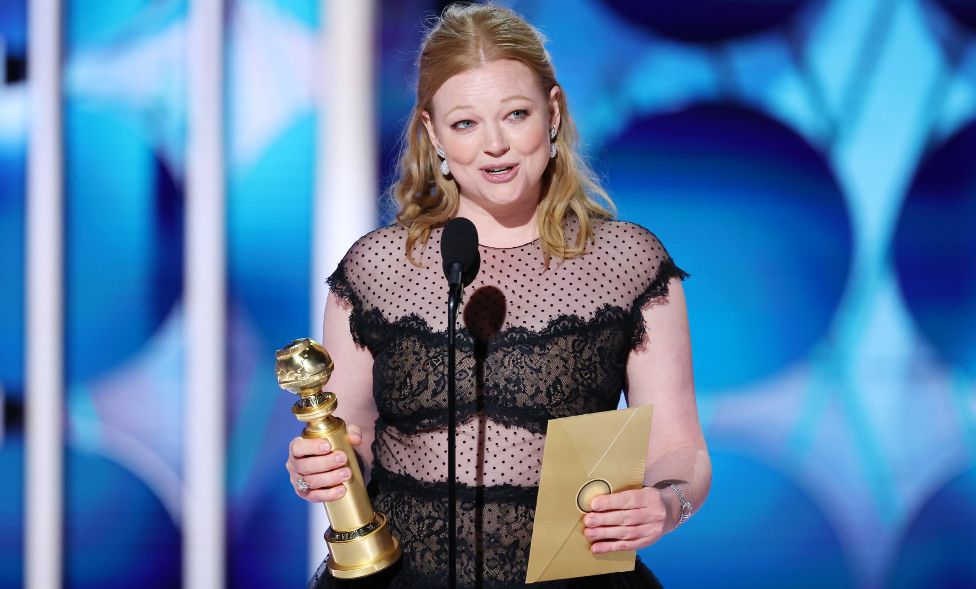

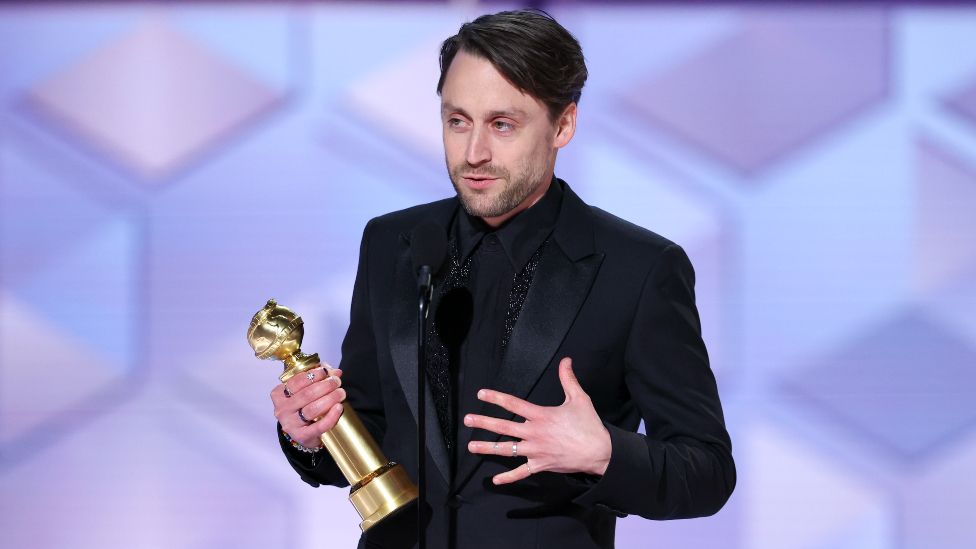

Succession was the big winner in the TV categories – following the fourth and final season of the series about a media mogul and his children who battle for control of his company.
Kieran Culkin, who played Roman Roy in the series, was named best leading TV actor – an award previously won by his co-stars Brian Cox and Jeremy Strong.
“I was nominated for a Golden Globe like 20 years ago,” he recalled, “and when that moment passed, I thought, ‘I’ll never be in this room again’.
“I accepted I was never going to be on this stage. But thanks to Succession…. this is a nice moment.”
His co-star Sarah Snook was named best leading TV actress, and told the audience: “This show has changed my life.”
British star Matthew Macfadyen was also named best supporting actor for his role in the show. “I just adored every second of playing the human grease stain that is Tom Wambsgans,” he joked.
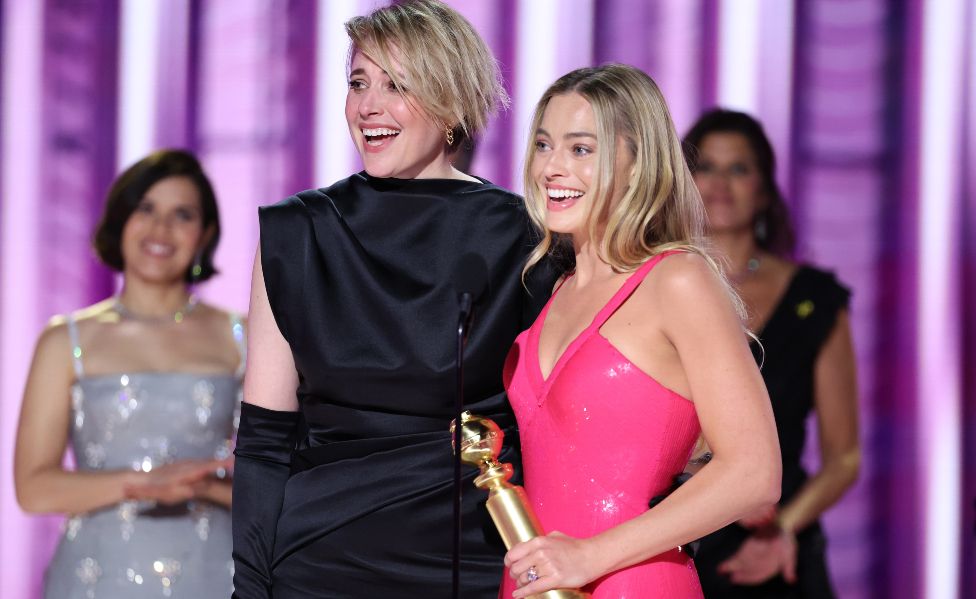

Barbie won the cinematic and box office achievement award – a newly added category this year which aimed to increase recognition of commercially successful films.
“We would like to dedicate to every single person on the planet who dressed up and went to the greatest place on earth – the movie theatres,” said the film’s star Margot Robbie.
“And thank you so much to the Golden Globes for creating an award that celebrates movie fans. This is a movie about Barbie but it’s also a movie about humans. We made it for you, and we made it with love, and thank you for loving it back.”
Billie Eilish also won best original song for What Was I Made For? – one of three songs which were nominated from the film’s soundtrack.
“It was exactly a year ago when I was shown the movie, and I was very miserable and depressed at the time, and writing that song kind of saved me a little bit,” Eilish said.
Da’Vine Joy Randolph won best supporting actress for her portrayal in The Holdovers of a woman suffering immense grief after the death of her son.
“Mary, you have changed my life, you have made me feel seen in so many ways,” she said, referring to the character she plays. “And I hope I helped you all find your inner Mary, because there is a little bit of her in all of us.”
Addressing the film’s director Alexander Payne, she said: “Thank you for giving me the opportunity to play this beautiful and flawed woman.”
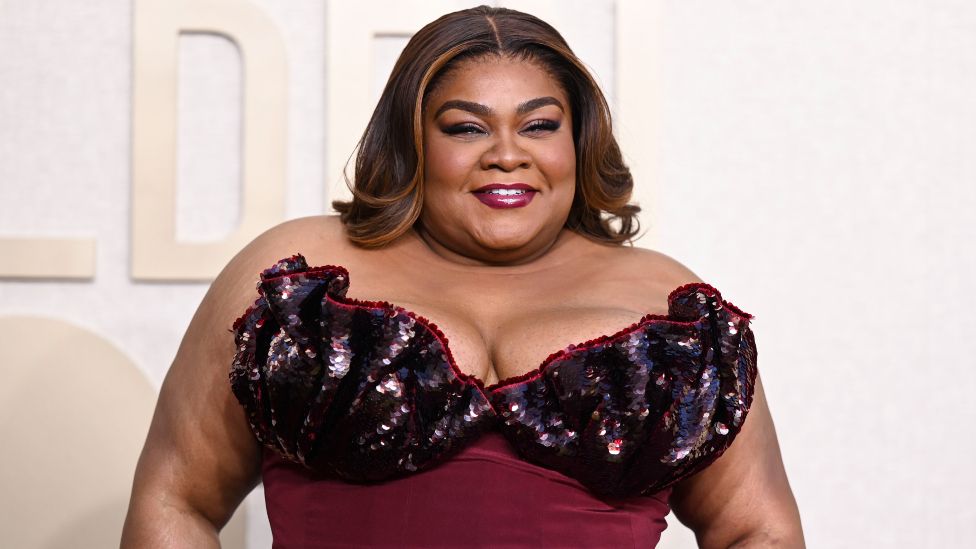

Her co-star Paul Giamatti was named best leading actor in a drama. He plays a teacher who is forced to stay in his boarding school over Christmas to look after the children who are not returning home for the holidays.
Climbing the steps to the stage to accept the award, he joked his “knees were shot”, adding: “I’m never going to be in John Wick 5 at this rate.”
He too paid tribute to Payne, calling him “Alexander the Great, who for some mysterious reason continues to have enormous faith in me and I don’t know why”.
Giamatti concluded: “It’s a movie about a teacher. My whole family are teachers, all of them going back generations. Teachers are good people, you’ve got to respect them, they do a tough job, so this is for teachers as well.”
Courtroom drama Anatomy of a Fall was named best screenplay. Its director Justine Triet recalled the process of writing the film with her partner Arthur Harari.
“We were in the pandemic,” she recalled, “and my life partner and I, we spent our days co-writing the screenplay for Anatomy of a Fall, stuck in our apartment – and strangely, nobody died.”
Early winners in the TV categories include Steven Yeun and Ali Wong – who were both recognised for their performances in Beef – and The Bear’s Jeremy Allen White and Ayo Edebiri.
Elsewhere, Elizabeth Debicki was named best supporting actress in a TV series for her portrayal of Princess Diana in The Crown. She thanked the show’s producers “for trusting me with this part”.
The Globes mark the first major ceremony of film awards season, which culminates with the Oscars on 10 March.
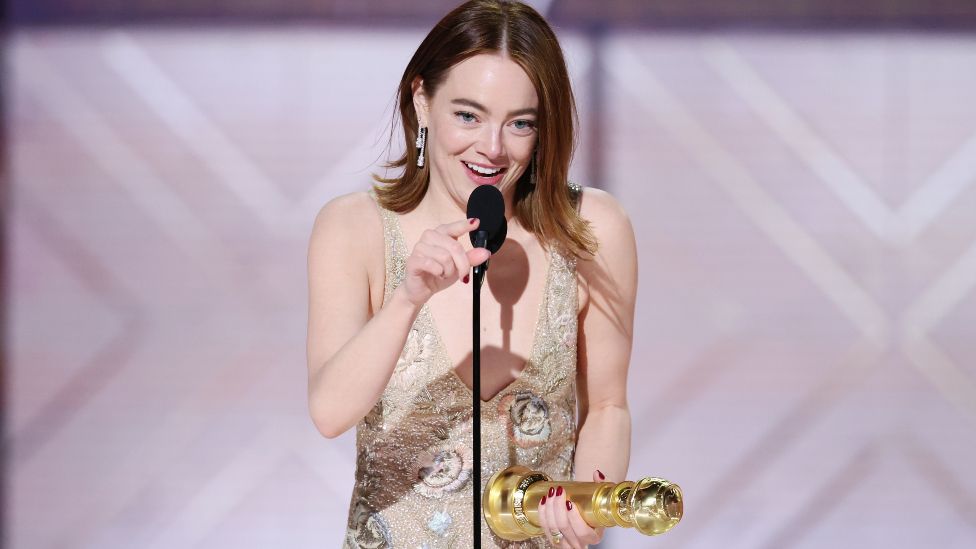

Emma Stone was named best actress in a musical or comedy for her performance in Poor Things, which also won best musical or comedy film.
Poor Things sees Stone play a young woman, Bella Baxter, who goes on a journey of self discovery and sexual awakening as she travels around the world.
“Bella falls in love with life itself, rather than a person, she accepts the good and bad in equal measure,” Stone said in her acceptance speech.
“And that really made me look at life differently, and that all of it counts. She has stayed with me deeply, so this means the world to me.”
She thanked director Yorgos Lanthimos, saying she would be “forever be grateful that we met”, and writer Tony McNamara, to whom she joked: “I love getting to say this dialogue, and I love getting to horrify you with my Australian accent.”


